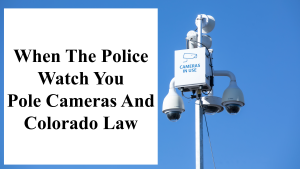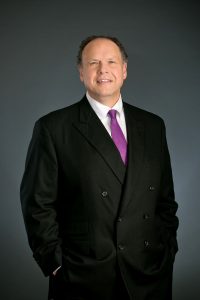When The Police Watch You – Pole Cameras And Colorado Law

By H. Michael Steinberg Colorado Criminal Defense Lawyer
Introduction – Technology That “Watches Us”
The collective forces of Colorado law enforcement use various technology to conduct surveillance ostensibly as a means of detecting crime. These technologies used can vary from GPS devices attached to automobiles, to cell towers used to trace the movement of cell phones, to the subject of this article – the use of so called “pole cameras” to record the movements of people in public places.
Pole cameras are not new technology. Numerous industries use pole cameras such as … disaster response teams, building inspectors, wildlife researchers, and utility providers. These sophisticated cameras can help improve efficiency, mitigate potential risks, and provide valuable data to aid informed decision-making.
But they also have a darker side, and the Courts have struggled to balance a citizens right to privacy with the relentless advance of technology.
The Right To Privacy And The Constitution
The Fourth Amendment protects:
“[t]he right of the people to be secure in their persons, houses, papers, and effects, against unreasonable searches and seizures.”
and was intended to:
“safeguard the privacy and security of individuals against arbitrary invasions by governmental officials.”
Camara v. Municipal Court of City and County of San Francisco, 387 U. S. 523, 528 (1967).
The “Fourth” was a response to the reviled ‘general warrants’ and ‘writs of assistance’ of the colonial era. These legal-at-the-time documents allowed British officers to rummage through homes in an unrestrained search for evidence of criminal activity.
Riley v. California Riley v. California, 573 U.S. 373, 393 (2014).
In one of the most significant and landmark cases interpreting the Fourth Amendment, Katz v. United States, 389 U. S. 347, 351 (1967), the United States Supreme Court established that “the Fourth Amendment protects people, not places.” Katz, expanded the conception of the Amendment to protect certain “expectations of privacy.”
The focus of the Court’s inquiry in a “Katz Analysis,” of an alleged privacy intrusion is whether the individual “seeks to preserve something as private” and whether that expectation of privacy is “one that society is prepared to recognize as reasonable…”
At the core of the analysis is this rule – where individuals have a reasonable expectation of privacy the government must proceed by warrant. But this Fourth Amendment analysis has struggled to respond to the expansion of surveillance tools available to law enforcement in the 21st century. New forms of technology have enhanced the Government’s capacity to encroach upon areas that are normally guarded from inquisitive eyes. One of those, of course, has been the pole camera.
Pole Cameras – The Impact On Civil Liberties
Pole cameras are surveillance devices typically mounted on utility poles, streetlights, or traffic signal poles. These cameras are commonly used by law enforcement agencies for various purposes, such as monitoring high-crime areas, tracking alleged suspects, and gathering evidence during ongoing police investigations.
Pole cameras are relatively inexpensive compared to other forms of surveillance, making them a common choice of law enforcement agencies. These cameras most often come with weatherproof casings, enabling them to operate in diverse weather conditions and to provide continuous monitoring. They require little upkeep, are attached to utility poles or other elevated structures and provide continuous, real-time surveillance in the targeted areas. They are also capable of being monitored remotely and are commonly used by law enforcement agencies to gather information and evidence of criminal activity in public spaces.
The Blurring Of The Right To Privacy – The Recent Colorado Case Of People v Woodyard Provides Much Needed Analysis On The Issue Of The Use Of Pole Cameras
The “legal boundaries” regarding pole cameras and the constitutional right to privacy has been somewhat blurred by courts all over the country in the last several years. Federal courts of appeals and several state supreme courts are divided over whether long-term pole camera surveillance of a person’s home impinges on reasonable expectations of privacy under the Fourth Amendment.
The very recent 2023 Colorado case of People v. Woodyard (Court of Appeals No. 19CA0376 Jefferson County District Court No. 16CR2265) provides guidance in the state of Colorado on this issue.
The Facts Of Woodyard
- Woodyard lived in a unit of a multi-family complex on a cul-de-sac. As part of a police investigation, law enforcement installed three cameras near Woodyard’s residence. Only one of the cameras, a camera mounted on a nearby telephone pole, was at issue.
- Woodyard’s street ended in a dead end and his apartment was near the camera at issue. Local law enforcement set up three surveillance cameras close to Woodyard’s home as part of their investigation.
- This pole camera captured all of the action that took place on the street and sidewalk in front of the building that housed Woodyard’s apartment. In addition to that, it displayed a thin slice of grass that was located in front of Woodyard’s unit.
- The camera did NOT reveal any portion of Woodyard’s unit (or the building in which it was located), as the view of Woodyard’s unit was obscured by another structure. A person could access or exit the front of Woodyard’s unit via another path and street without being seen by the camera.
- The camera was operational for six weeks. At his trial, the prosecution played portions of the video in court to demonstrate the order in which individuals visited Woodyard’s cell and the times at which they did so.
Woodyard argued the evidence gathered from the camera was “prolonged and uninterrupted surveillance” and therefore constituted an unlawful warrantless search in violation of the Fourth Amendment to the Constitution of the United States.
The Trial Court concluded that the surveillance did not qualify as a search under the Fourth Amendment since the camera could only see an open area, which included the public street and sidewalk, and “that anyone walking down the street could see.” According to the lower Court’s reasoning of the court, Woodyard did not have any right to privacy in the location that was being monitored.
The Colorado Supreme Court agreed and concluded that the pole camera surveillance didn’t constitute a search within the purview of the Fourth Amendment.
Comparing and Contrasting The Woodyard Case With The Precedent of People v. Tafoya
An earlier case, People v. Tafoya (discussed in the decision) came to the opposite conclusion. The key distinguishing facts in a comparison of the cases are as follows:
In Tafoya, the police recorded the front yard, backyard, and driveway for more than three months, using a camera mounted on a utility pole across the street from the subject property. The detached garage, backyard, and part of the driveway were enclosed by a six-foot-high privacy fence. The camera allowed the police to view parts of Tafoya’s property “not usually visible to members of the public.” The evidence at issue, therefore, was obtained from video surveillance of those enclosed portions of the property.
The Court held that the long-term, continuous surveillance of the enclosed portions of Tafoya’s property constituted a search. The Court held that Tafoya had a:
“subjective expectation of privacy in the area surveilled because it was his backyard;”
…the area was
“significantly set back from the street, so a person standing on the street could not see into the backyard”;
and that,
“Tafoya maintained a six-foot-high privacy fence around the backyard”; and he used a gate “to further prevent the public from being able to see into his backyard.”
Tafoya’s subjective expectation of privacy was
“one that society is prepared to recognize as reasonable… ”
In a nutshell, the Woodyard Court held that Woodyard had no subjective expectation of privacy in the area surveilled that society is prepared to recognize as reasonable.
The area recorded was not merely accessible it was exposed to the public, it was owned by the public and “a person has a reasonable expectation of privacy in a public street or sidewalk.”
Summary and Conclusion – When The Police Watch You – Pole Cameras And Colorado Law
Pole camera surveillance reveals the intimate details of their lives. Details of our family, friends and visitors. Pole camera surveillance is different from human observation.
It is continuous, indiscriminate, and technologically enhanced. Monitoring can stretch for days, weeks, or even months, creating a permanent record of our public movements. Agents can watch a camera’s feed in real time, and remotely pan, tilt, and zoom close enough to read license plates and see faces and then review a searchable, digitized record of this footage at their convenience.
The use of pole cameras by the State forces a balance between public safety and personal privacy in the digital age. These cameras raises serious questions about the balance between public safety and individual privacy. These cameras create an inherent “chilling effect” that one is being watched creating a kind of “Orwellian” society.
Colorado Criminal Law – When The Police Watch You – Pole Cameras And Colorado Law
The reader is alerted to the fact that Colorado criminal law, like criminal law in every state and at the Federal level, changes constantly. The article appearing above was accurate at the time it was drafted but it cannot account for changes occurring after it was uploaded.
 ABOUT THE AUTHOR: H. Michael Steinberg – Email The Author at: hmsteinberg@hotmail.com
ABOUT THE AUTHOR: H. Michael Steinberg – Email The Author at: hmsteinberg@hotmail.com
A Denver Colorado Criminal Defense Lawyer – or call his office at 303-627-7777 during business hours – or call his cell if you cannot wait and need his immediate assistance – please call 720-220-2277.
“A good criminal defense lawyer is someone who devotes themselves to their client’s case from beginning to end, always realizing that this case is the most important thing in that client’s life.”
Putting more than 40 years of Colorado criminal defense experience to work for you.
You should be careful to make a responsible choice in selecting a Colorado Criminal Defense Lawyer. We encourage you to “vet” our firm. Over the last 40 years – by focusing ONLY on Colorado criminal law – H. Michael has had the necessary time to commit to the task of constantly updating himself on nearly every area of criminal law, to include Colorado criminal law and procedure and trial and courtroom practice.
H. Michael works hard to get his clients the best possible results in and out of the courtroom. He has written, and continues to write, extensively on Colorado criminal law and he hopes this article helps you in some small way.
 Colorado Criminal Lawyer Blog
Colorado Criminal Lawyer Blog

